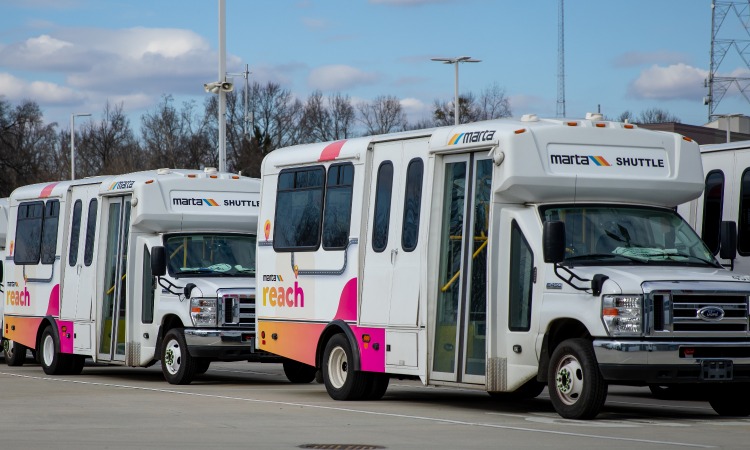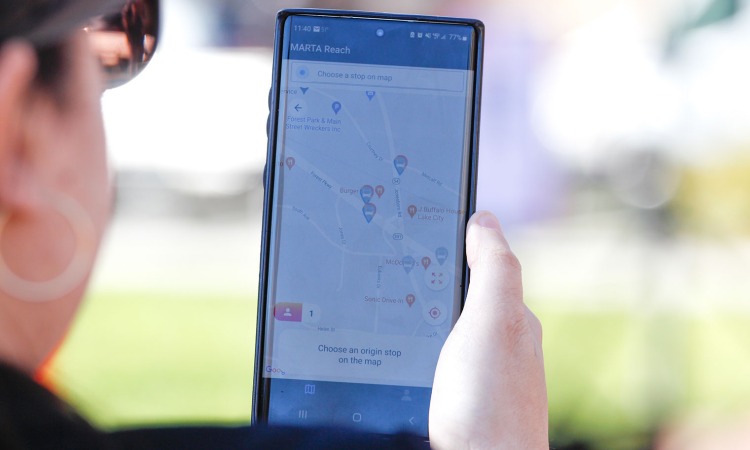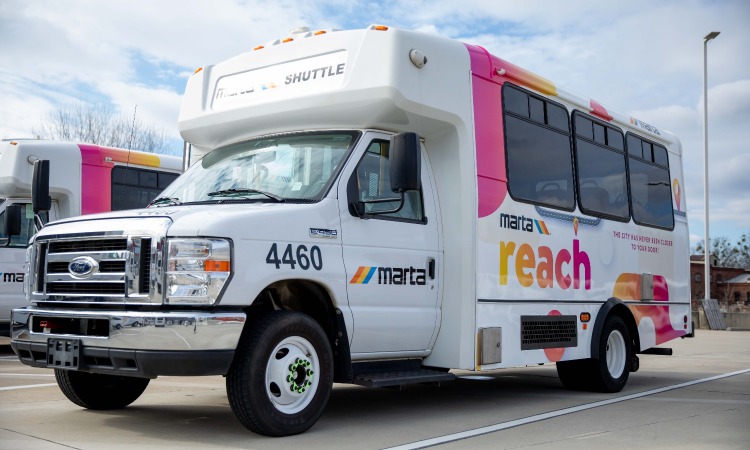MARTA Reach: Keeping customers connected to public transport
- Like
- Digg
- Del
- Tumblr
- VKontakte
- Buffer
- Love This
- Odnoklassniki
- Meneame
- Blogger
- Amazon
- Yahoo Mail
- Gmail
- AOL
- Newsvine
- HackerNews
- Evernote
- MySpace
- Mail.ru
- Viadeo
- Line
- Comments
- Yummly
- SMS
- Viber
- Telegram
- Subscribe
- Skype
- Facebook Messenger
- Kakao
- LiveJournal
- Yammer
- Edgar
- Fintel
- Mix
- Instapaper
- Copy Link
Posted: 28 April 2022 | Metropolitan Atlanta Rapid Transit Authority (MARTA) | No comments yet
For Intelligent Transport, the Metropolitan Atlanta Rapid Transit Authority provides exclusive insight into its recently launched on-demand ride-share pilot programme, MARTA Reach, which is working to provide personal transportation at a low cost by combining on-demand ride-share with public transit.


Credit: Metropolitan Atlanta Rapid Transit Authority
MARTA Reach will test how on-demand shuttles can be used to make it easier and faster for customers to get to their destinations using MARTA and help to minimise waiting and walking”
The Metropolitan Atlanta Rapid Transit Authority (MARTA), one of the largest public transportation agencies in the U.S., transports millions of people through the metro Atlanta region every year, with 38 heavy rail and 12 light rail stations, 9,000 bus stops and paratransit services. In order to test how on-demand ride-share services can be used to connect customers in areas underserved by transit to the bus and rail system in the metro Atlanta area, MARTA –working together with the Georgia Institute of Technology (Georgia Tech) – recently launched a six-month pilot programme called MARTA Reach.
MARTA Reach will test how on-demand shuttles can be used to make it easier and faster for customers to get to their destinations using MARTA and help to minimise waiting and walking. Think ride-sharing platforms such as Uber or Lyft, but this service has a low, flat fee that’s the same as the usual fare ($2.50), and transfers to the bus and rail system are free. Currently, the pilot runs weekdays from 06:00 until 19:00 and is a true ride-sharing service, meaning that other passengers may be picked up and dropped off during the trip.
Providing personal transportation at a low cost
Combining on-demand ride-share with public transit enables MARTA to provide personal transportation at a low cost and serves as a vital connection to the larger MARTA system”
MARTA’s Interim General Manager and CEO, Collie Greenwood, says that combining on-demand ride-share with public transit enables MARTA to provide personal transportation at a low cost and serves as a vital connection to the larger MARTA system for those customers in areas underserved by transit.
Greenwood said: “MARTA is eager to see how the service is used and whether it could be adopted and expanded. We are currently exploring a redesign of our entire bus network to make sure that our service adapts to the changing needs of our customers and the changing landscape of our service area. MARTA Reach could help complement this redesign by offering first- and last-mile connectivity to the greater transit system.”


Credit: Metropolitan Atlanta Rapid Transit Authority
Areas of service
The MARTA Reach pilot serves three strategic neighbourhoods: West Atlanta, Belvedere Park and Fort Gillem. These neighbourhoods were selected not only because they are currently underserved by transit, but because of the different transit needs of each community.
West Atlanta, Belvedere Park and Fort Gillem… were selected not only because they are currently underserved by transit, but because of the different transit needs of each community”
The Gillem Logistics Center at Fort Gillem houses large e-commerce and distribution centres, with thousands of employees who could use more efficient transportation. West Atlanta is residential, with roads often too narrow for MARTA’s full-sized buses, and Belvedere Park is a mixed-use neighbourhood that combines business and residential zoning.
David Matthews, General Manager at the Kroger Fulfillment Center located at Fort Gillem, believes that MARTA Reach provides a much-needed solution for employees who need dependable transportation.
“There are about 2,500 employees within the Gillem Logistics complex across 17 businesses that have employees who need reliable transportation. I think that an on-demand service could have a positive impact on Kroger’s ability to attract and retain people wanting to work,” said Matthews.
Partnering with Georgia Tech
Georgia Tech industrial engineering professor Pascal Van Hentenryck began thinking about tackling first- and last-mile connectivity challenges four years ago and, in 2020, reached out to MARTA about the possibility of an on-demand network.
“Public transit is the most cost-effective way to move people,” said Van Hentenryck. “But, in Atlanta, some people have difficulty getting to a MARTA bus or train.”
Public transit is the most cost-effective way to move people. But, in Atlanta, some people have difficulty getting to a MARTA bus or train”
Van Hentenryck and Georgia Tech’s Industrial and Systems Engineering (ISyE) team are providing the technology for the pilot programme, including routing logic and rider, operator and administrator system apps. During the pilot test, customers will use the MARTA Reach app to call for a shuttle and their request will be routed through a server at Georgia Tech that connects to the drivers on MARTA’s new fleet of Reach vehicles.
“We developed the cloud computing platform, connected riders and drivers, and we’re making sure that the whole system is synchronised,” said Van Hentenryck. “MARTA has been extremely collaborative throughout the process and provided us with vast amounts of data and insights to drive the process.”
“We couldn’t be happier that Van Hentenryck and his team are willing to study our ridership to see what the needs are and tailor a solution,” said Greenwood.


Credit: Metropolitan Atlanta Rapid Transit Authority
Project funding
MARTA and Georgia Tech Research Corporation received a $1 million grant in Autumn 2021 from the U.S. National Science Foundation to pilot the programme. The Civic Innovation Challenge Award supports community-based initiatives to address mobility and disaster challenges.
President of the Georgia Institute of Technology, Ángel Cabrera, said: “Georgia Tech’s mission calls us to develop leaders who advance technology and improve the human condition. To use our research and expertise to improve lives and livelihoods. That’s why we’re here. We’re grateful for the opportunity, for the support of MARTA and the National Science Foundation, and for the great work by Professor Van Hentenryck’s team.”
Looking to the future
MARTA and Georgia Tech will analyse data from the pilot programme to determine how many people are taking advantage of the service and how long it takes to fulfil riders’ requests.
If the pilot shows positive impacts, Georgia Tech researchers say that it could serve as a model for more major metropolitan areas.
“We can take on projects that are not just technologically cool and exciting, but at the same time they also have a big impact on society,” said Van Hentenryck.
MARTA will re-evaluate the service zones, days and hours to ensure that it is best meeting the needs of customers”
MARTA Reach launched on 1 March 2022 and will run through to August 2022. The Reach vehicles are 16 re-purposed paratransit vans from MARTA’s mobility service that can accommodate up to eight people and are wheelchair accessible.
The current service model may be adjusted if pilot data warrants and if the on-demand service is deemed successful and expanded in metro Atlanta. MARTA will re-evaluate the service zones, days and hours to ensure that it is best meeting the needs of customers.
Established in 1971, the Metropolitan Atlanta Rapid Transit Authority (MARTA) is among the largest transit agencies in the U.S., providing 95 per cent of the public transit trips in the metro Atlanta region with 110 fixed bus routes, 38 heavy rail stations, 2.7 miles of light rail and on-demand paratransit services.
MARTA is primarily funded by a one per cent sales tax in Fulton, DeKalb and Clayton counties, and a 1.5 per cent sales tax in the City of Atlanta. MARTA’s FY 2022 operating and capital budgets total $1.3 billion.
Related topics
Accessibility, Fleet Management & Maintenance, Mobility Services, On-Demand Transport, Passenger Experience, Public Transport, Sustainable Urban Transport, Ticketing & Payments, Transport Governance & Policy
Related modes
Ride-sharing & Car-sharing
Related cities
Atlanta
Related countries
United States
Related organisations
Georgia Tech Research Corporation, Metropolitan Atlanta Rapid Transit Authority (MARTA)
Related people
Ángel Cabrera, Collie Greenwood, David Matthews, Pascal Van Hentenryck








